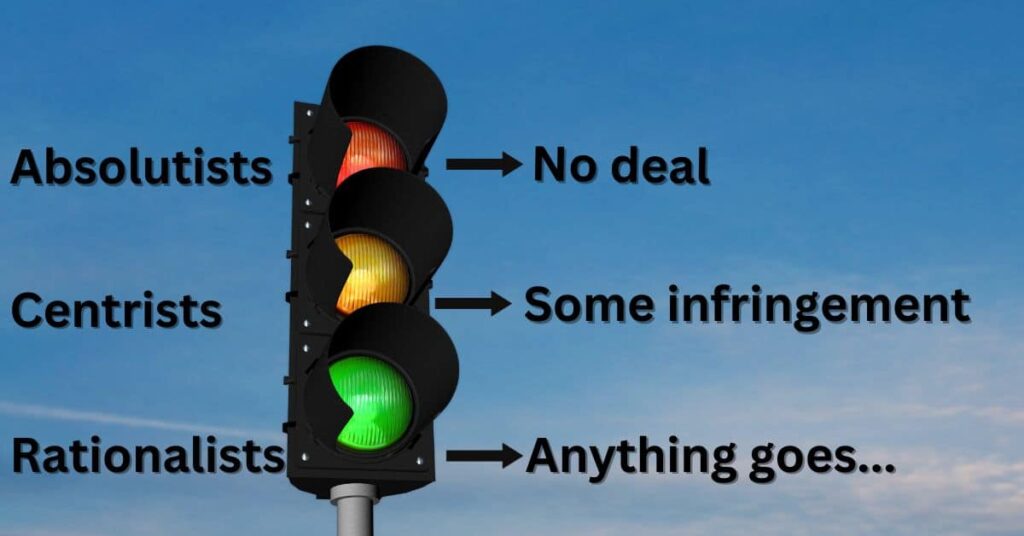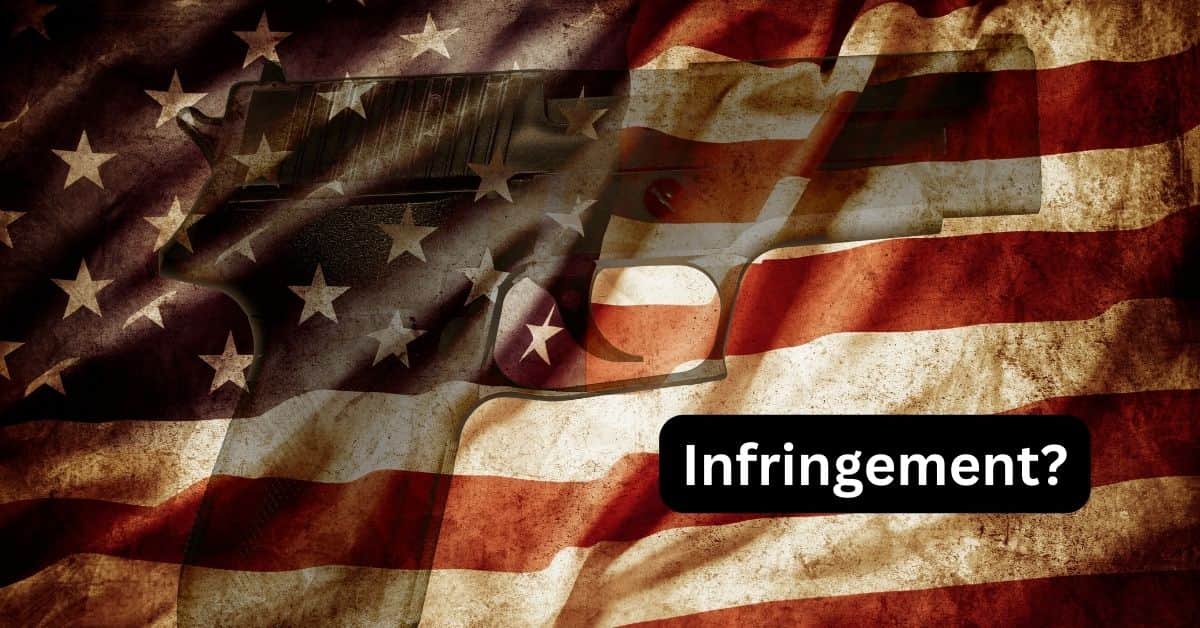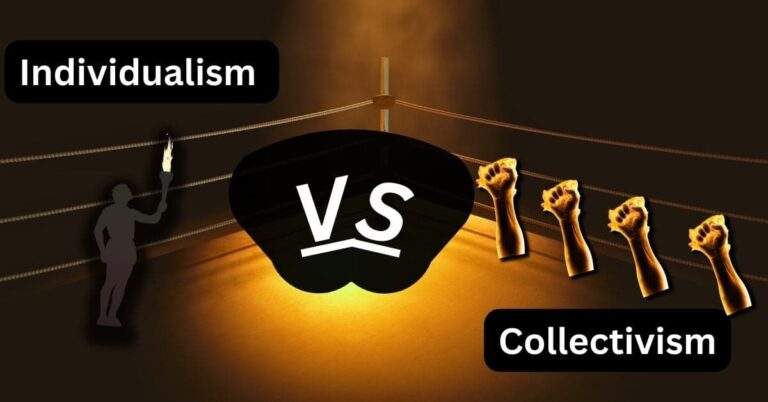Your personal boundaries determine how far people push you. In the 2A world, government encroachment on your right to bear arms comes to mind. Individuals vary in their tolerance for societal infringements on their rights.
The three levels of 2nd Amendment infringement include: no comprise Absolutists, intermediate Centrists, and Rationalists. Each side relates to the 3 levels of Supreme Court scrutiny for judging law constitutionality. Courts are the arbitrators between infringing government laws and liberty.
This hot topic of infringement is a never-ending battle. The Founders did say “shall not be infringed”. What does that mean to you? Find out below which personality type you fit into for this great debate.
3 Levels of Infringement and Scrutiny Explained
The best way to describe infringement is to relate them to the scrutiny codes used by the high U.S. courts.
Our judicial system determines what laws are acceptable. Why not use their modes of thought to describe people’s feelings toward infringement?
Each scrutiny relates to public perception and feelings about the laws passed. Bad laws turn rights into privileges, limiting your freedoms at a drastic cost.
Thus, scrutiny accounts for purpose and means in law.
- Purpose: Is the purpose legitimate?
- Means: Do the means of the law achieve the desired purpose constitutionally?
Next, let me briefly describe the 3 levels of scrutiny used. This knowledge will help you understand the future sections in this post.
Strict Scrutiny:
Government must prove a compelling purpose for the law. The regulation can’t be broad with mass generalizations infringing on rights.
Notice the use of the term compelling. Compel strongly emphasizes the government’s burden of proof for the law’s existence.
Infringement category: No Compromise Absolutists
Intermediate Scrutiny:
To pass this test, the law must have an important purpose. Governments still have the burden of proof but not as bad as strict scrutiny.
Again, breaking down the vocabulary, the important purpose isn’t as strong as to compel.
Infringement Category: Intermediate Centrists
Rational Scrutiny:
This scrutiny test is highly subjective and the lowest one. As a result, most laws can have a rational basis to pass further infringing on firearm ownership.
The burden of proof is on the individual challenging the law- not the government.
Infringement Category: The Rationalists
Infringement Free Absolutists-No Deals
If you sat across the negotiating table from an Absolutist named Sawyer, you’d grow frustrated. He doesn’t want legislators to introduce any new laws.
Sawyer is the typical Absolutist. He wants the government to leave him alone with his family as a top priority. But he will not idly sit by waiting for his country to wreck itself.
Any bill introduced is an infringement on Sawyer’s right to keep and bear arms. He’s a constitutional Absolutist and Originalist.
In modern lingo, Sawyer wants the Constitution interpreted
as the Founding Fathers did. American ideals such as liberty and limited government- remain close to him.
As a 2nd Amendment Die-Hart, he will not apologize for his stance.
How do you describe personality types like Sawyer?
Personality traits include:
- hard-core individualists
- outspoken
- boisterous
- activists
In short, outspokenness rejects government infringement.
He aligns with strict scrutiny interpretation. Originalists believe judges should use historical context to determine a law’s constitutionality. That’s what the Founding Fathers would do.
He believes in individual firearm rights-not mandatory service in a state-controlled militia. Sawyer has a wide friend network to gather fellow citizen soldiers with their private arms if needed. He is the Paul Revere of his era.
Many would answer the call to serve if their personal situations allowed.
Yet, if the government infringes, courts must act, and Sawyer would lead the charge. Lacking weapons hinders the rights of a citizen soldier.
What kinds of laws infringe? Strict scrutiny would nullify regulations such as:
- National Firearms Act of 1934
- Gun Control Act of 1968
- Reduce import restrictions
All these laws hinder firearm ownership. They contradict the American ideals of liberty presented by the Founding Fathers.
Absolutists’ staunch stance against new laws draws attention from critics as being uncaring. Opponents emphasize the need for regulations to prevent crime.
In response, the “No-Deal” crowd simply makes one statement: “Criminals don’t follow the law.” The only way to combat offenders is preparedness with self-defense.
Overall, Absolutists believe in strict scrutiny interpretation to stop infringement. Their loud unpredictable nature makes them a great guard against tyranny.
Middle of the Road Centrists- Some Infringement
Sitting at the negotiating table with Robin and Harvey is less frustrating. Instead of an impasse, you’ll likely pass some laws. They don’t mind infringement because they want added safety.
Robin and Harvey are a suburban, white-collar American family with 2 kids. They’re weary of the ongoing violence they see and want it to stop. School safety is their #1 issue.
Their philosophy and motto are:
“Send me the law so I can examine if it is reasonable.”
Intermediate Centrists
Centrists- like Robin and Harvey- aren’t people pleasers but navigate between extremes. They’re the calm voice between the absolutists and rationalists. Bridging the gap and making amends are their primary goals.
They don’t necessarily align with originalists’ views but understand their plight. At times, all you need is someone to acknowledge your opinions to change your mind.
What types of people do you consider in this category?
You would find RHINOs (Republicans In Name Only) or swing Democrat voters. Some consider RHINOS more liberal than conservative
They align with the intermediate scrutiny interpretation. Centrists don’t want all laws but a few stretching the originalists’ interpretation is okay.
Also, the personality traits of these intermediates include:
- Calm and level-headed
- No judgment until all the facts are present
- Peacemakers
You won’t find these people in the streets protesting 2nd Amendment injustices. But they will be in the legal observer shirts to keep situations as fair as possible.
They don’t want friction but to satisfy all sides.
Moreover, they believe the modern militia is the National Guard. They don’t agree with the citizen soldier concept.
Individual rights are important but not the most important. Citizens can own weapons like shotguns or ole wooden hunting rifles. Handguns and AR-15 rifles are questionable. Thus, you see they don’t share the absolutist view of no infringement
Banning weapons such as handguns and rifles could be okay. This is the definition of “some infringement”.
Next, let’s define some specific policies.
Some acceptable rules without too much infringement include:
- universal background checks
- magazine capacity limits
- assault weapons ban
Each of these laws isn’t too burdensome on the average citizen. Centrists believe that an extra background check requires a little extra time. No big deal, right?
Magazine limits make sense. It will save lives.
And assault weapons bans aren’t an arbitrary regulation. According to them, studies prove that these bans reduce mass casualty events.
Absolutists disagree because these bans are only for public perception. Rifles don’t consist of the majority of gun deaths.
Centrists believe in the middle ground and are peacekeepers of the infringement categories. Some laws are good but not all laws. Thus, they will reject outright gun confiscations openly.
More than likely, you will find yourself in this group with Robin and Harvey if you don’t follow gun politics closely.
2nd Amendment Articles:
• In the word of infringement, understanding guns as a right or privilege is important. LEARN MORE by exploring the most common gun question.
• Centrist can see the positive of guns. LEARN MORE by reading benefits to owning firearms.
Go With the Flow Rationalists- A lot of Infringement
Rationalists willingly accept infringements in the name of public safety. If a law banned all guns, they’d approve it unanimously.
Our next introduction is Maria. She is a devout rationalist and hates what she sees on the news. Maria accepts any government measures to stop the flow of crime. Nothing will persuade her to stop the necessary precautions.
Absolutists see Maria’s position as scary. The burden of proof to decide infringement falls onto the person challenging the law. Government doesn’t have to justify its new law to “We the People.”
The types of people who believe in rationalist scrutiny are:
- Hippies
They seek to promote peace through the absence of any kind of weapon.
Example: Regular anti-cultural people
- Collectivists
A term used to describe the 2nd Amendment position where gun ownership is a privilege. Collectivists don’t see firearm ownership as an individual right.
Example: Scholarly intellectuals
- Rational Opportunists
Some of the sneakiest individuals. They’re indirect as to their fundamental goals but advocate for gun control behind the curtain.
While this isn’t a widely used term to explain gun control advocates, it is important to name it.
Examples: Heads of gun control organizations
- Pro-Gun Control General Public
This is a blanket term for anyone who wishes for the abolition of guns worldwide. Society isn’t a place where civilians should own weapons. Yes, knives, pepper spray, or clubs aren’t necessary
Examples: Reactionary Protestors
The Rationalists’ motto is:
“If the law keeps me safe, I’m for that.”
Rationalists
Put simply, they’ll accept any law in the name of safety, even if its impact is minimal on crime.
Overall personality types to match this level of infringement are:
- opportunists
- meek
- scared
The combination of fear and shyness leads to tyranny. Typically, populations who don’t value self-defense let governments abuse them. They feel as if the police are the only means of protection.
As a result, Rationalists-like Maria- believe infringement is okay to keep them safe at all costs. Governments keep introducing laws without pushback. One day you wake up wondering how the country you loved ended up in the gutter.
Also, Rational Opportunists leverage sensitive circumstances to promote radical gun control policies. Since they have financial backing, they’ll lobby Congress to pass the laws.
This is the ultimate view of intrusion. It leaves nothing open to interpretation. Judges will rule that firearms are a privilege-not a right.
Overall, rationalists don’t believe any violation is too much. They want firearms out of the civilian’s hands. To them, that’s the simplest and easiest way to rationalize safety.

Conclusion
Your stance on 2nd Amendment infringement mirrors your views on firearms. While you accept infringement in firearms laws, you’d resist freedom of speech censorship.
Letting restrictions escalate is a “slippery slope” in the 2nd Amendment community. Once you let someone have a taste of sugar, they want more and more. That sweetness is irresistible.
In this case, the “sweetness” is the acceptance of infringements until firearm ownership disappears.
Match your views on infringement with the Supreme Court’s scrutiny levels.
- Strict Scrutiny- No Deal Absolutists
- Intermediate Scrutiny- Some Infringements Centrists
- Rational Scrutiny- Too Much Infringement Rationalists
Your position on the infringement spectrum reflects the freedoms you’re willing to trade for safety. Either you’ll take some of the most egregious restrictions in stride or protest them.
Have you ever heard infringement levels described like this? Which one do you agree with more?
J. LIberty
LEARN MORE by comprehending the 2nd Amendment’s language in detail. I give you an analysis word-for-word.
References:
Snider, B. (2020, May 12). Challenging Laws: 3 Levels of Scrutiny Explained. Retrieved from findlaw.com.
Photo Credits
Photo Credits:
© vitalli via canva.com
© stillFX via canva.com



